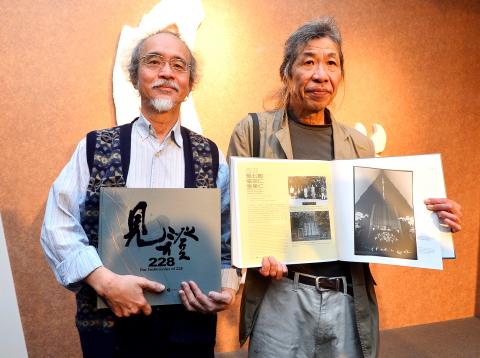As the nation prepares to mark the 68th anniversary of the 228 Incident on Saturday, the 228 Memorial Foundation yesterday released a collection of photographs and interviews recounting the stories of families affected by the massacre.
Completed over a course of five years, the two-volume collection, titled Testimonies of 228 (見證228), features black-and-white portraits of the people interviewed, who include both elderly survivors and family members from around the nation.
Short excerpts from the interviews are presented in both Mandarin and English.

Photo: Wang Yi-sung, Taipei Times
The compilation was produced by photojournalist Pan Hsiao-shia (潘小俠), human rights activist and oral history expert Chen Ming-cheng (陳銘城) and historian and former political prisoner Yang Bi-chuan (楊碧川).
Over the course of four years, beginning in 2010, the trio traveled across the nation to interview a total of 228 families who were affected by the incident.
Pan embarked on the journey after he completed a photojournalism project focusing on victims of political prosecution during the White Terror era, which followed the 228 Incident and reached its peak during the 1950s and 1960s.
“We interviewed so many people. While the stories were different, they evoked the same emotions,” Yang said, adding that through the work of historians, Taiwanese have slowly uncovered the truth about the 228 Incident.
The foundation said that photographs and images related to the 228 Incident are scarce because the incident was considered taboo during the Martial Law era.
The Incident began on the afternoon of Feb. 27, 1947, when six agents of the Monopoly Bureau’s Taipei branch tried to confiscate illegal cigarettes that widow Lin Chiang-mai (林江邁) was selling in front of the Tien-ma Tea House and her money. After she refused to hand over her stock, she was pistol-whipped on the head and passed out, triggering protests from bystanders. As the agents fled the scene, they opened fire on the crowd, wounding one man, who died the next day.
When word of the incident spread, police stations and military police headquarters were besieged by protesters demanding the Monopoly Bureau agents be prosecuted. The following morning, demonstrators ransacked the Monopoly Bureau’s Taipei branch office. When a crowed gathered in front of the Provincial Executive Office in the afternoon to petition the government over the incidents, military police opened fire with machine guns, killing or injuring several dozen people.
The Garrison Command Headquarters declared a state of emergency and in the ensuing months, a crackdown by the then-Chinese Nationalist Party (KMT) government saw tens of thousands of Taiwanese detained or killed, including a large number of the intellectual elite.
Additional reporting by staff writer

Alain Robert, known as the "French Spider-Man," praised Alex Honnold as exceptionally well-prepared after the US climber completed a free solo ascent of Taipei 101 yesterday. Robert said Honnold's ascent of the 508m-tall skyscraper in just more than one-and-a-half hours without using safety ropes or equipment was a remarkable achievement. "This is my life," he said in an interview conducted in French, adding that he liked the feeling of being "on the edge of danger." The 63-year-old Frenchman climbed Taipei 101 using ropes in December 2004, taking about four hours to reach the top. On a one-to-10 scale of difficulty, Robert said Taipei 101

Nipah virus infection is to be officially listed as a category 5 notifiable infectious disease in Taiwan in March, while clinical treatment guidelines are being formulated, the Centers for Disease Control (CDC) said yesterday. With Nipah infections being reported in other countries and considering its relatively high fatality rate, the centers on Jan. 16 announced that it would be listed as a notifiable infectious disease to bolster the nation’s systematic early warning system and increase public awareness, the CDC said. Bangladesh reported four fatal cases last year in separate districts, with three linked to raw date palm sap consumption, CDC Epidemic Intelligence

Two Taiwanese prosecutors were questioned by Chinese security personnel at their hotel during a trip to China’s Henan Province this month, the Mainland Affairs Council (MAC) said yesterday. The officers had personal information on the prosecutors, including “when they were assigned to their posts, their work locations and job titles,” MAC Deputy Minister and spokesman Liang Wen-chieh (梁文傑) said. On top of asking about their agencies and positions, the officers also questioned the prosecutors about the Cross-Strait Joint Crime-Fighting and Judicial Mutual Assistance Agreement, a pact that serves as the framework for Taiwan-China cooperation on combating crime and providing judicial assistance, Liang

US climber Alex Honnold left Taiwan this morning a day after completing a free-solo ascent of Taipei 101, a feat that drew cheers from onlookers and gained widespread international attention. Honnold yesterday scaled the 101-story skyscraper without a rope or safety harness. The climb — the highest urban free-solo ascent ever attempted — took just more than 90 minutes and was streamed live on Netflix. It was covered by major international news outlets including CNN, the New York Times, the Guardian and the Wall Street Journal. As Honnold prepared to leave Taiwan today, he attracted a crowd when he and his wife, Sanni,